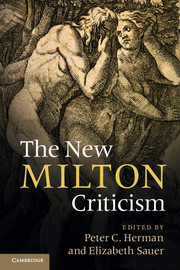Book contents
- Frontmatter
- Contents
- Notes on contributors
- Acknowledgments
- Note on editions
- Introduction Paradigms lost, paradigms found: the New Milton Criticism
- Part I Theodicies
- Chapter 1 Milton’s fetters, or, why Eden is better than Heaven
- Chapter 2 “Whose fault, whose but his own?”
- Chapter 3 The political theology of Milton’s Heaven
- Chapter 4 Meanwhile: (un)making time in Paradise Lost
- Chapter 5 The Gnostic Milton: salvation and divine similitude in Paradise Regained
- Chapter 6 Discontents with the Drama of Regeneration
- Part II Critical receptions
- Index
- References
Chapter 1 - Milton’s fetters, or, why Eden is better than Heaven
Published online by Cambridge University Press: 05 June 2012
- Frontmatter
- Contents
- Notes on contributors
- Acknowledgments
- Note on editions
- Introduction Paradigms lost, paradigms found: the New Milton Criticism
- Part I Theodicies
- Chapter 1 Milton’s fetters, or, why Eden is better than Heaven
- Chapter 2 “Whose fault, whose but his own?”
- Chapter 3 The political theology of Milton’s Heaven
- Chapter 4 Meanwhile: (un)making time in Paradise Lost
- Chapter 5 The Gnostic Milton: salvation and divine similitude in Paradise Regained
- Chapter 6 Discontents with the Drama of Regeneration
- Part II Critical receptions
- Index
- References
Summary
This essay joins the chorus of those from Blake to Tillyard and beyond who have seen Paradise Lost as a poem deeply divided against itself. The essay is not a “Satanist” reading, although it does adopt a number of premises of the “Satanist” view. It adopts Blake’s idea that Milton wrote “in fetters” of God and the good angels, and it will adopt Shelley’s view of Heaven and Hell in the poem as, in a sense, morally equivalent. It will try to address Empson’s feeling that even though the Shelleyan view is true, it “leaves the mind unsatisfied” because, in holding it, one “becomes so baffled in trying to imagine how Milton came to write as he did.” The most problematic and unsatisfactory aspects of the poem will be seen as flowing directly from Milton’s conscious and articulated intentions: to show God to be good, or at least, not to be wicked. Where I differ from many other critics is that while they think that the aesthetic (and religious) success of the poem depends on the success of its theodicy, I think that the attempt at theodicy – whether one regards it as successful or not – produces most of the aesthetic and religious failures of the poem. I see the great aesthetic and religious success of the poem, where Milton wrote without fetters, as being in an area free of the Great Argument: the presentation of Eden and of unfallen human life within it.
Rationalism (and on Christian doctrine)
It is important to be clear from the outset about the implications of theodicy. It is essentially a rationalistic project. Although many critics are confused about this, it is not a project that an echt Calvinist would attempt. As John Rumrich has rightly noted, the context represented by the shared beliefs of Luther and Calvin was “deeply inimical to the very notion of theodicy.” The idea of showing God to be “good” – of showing divine actions to correspond to some humanly intelligible conception of fairness – verged upon blasphemy for Luther and Calvin. Luther mocked Erasmus for wanting God to be “good.” The author of Paradise Lost stands squarely with Erasmus.
- Type
- Chapter
- Information
- The New Milton Criticism , pp. 25 - 48Publisher: Cambridge University PressPrint publication year: 2012
References
- 2
- Cited by



